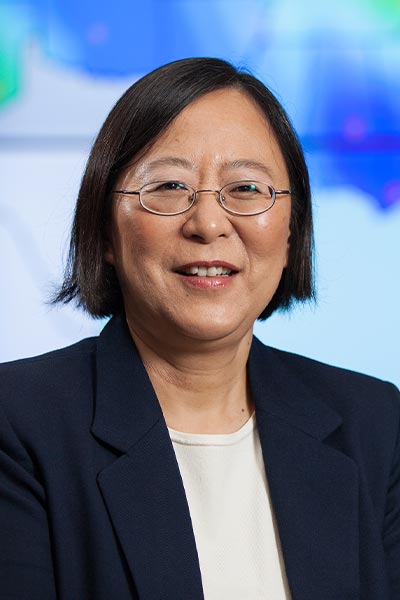
UT: liu@utk.edu
ORNL: liuy1@ornl.gov
Phone
UT: 865-974-4129
ORNL: 865-241-2314
Yilu Liu has dedicated her career to keeping America’s power on.
Hired in 2009 as the UT-ORNL Governor’s Chair for Power Grids, Liu is an electrical engineer whose work focuses on developing new and better ways to monitor and understand the flow of electrical energy through the nation’s power grid. She is deputy director of the Center for Ultra-wide-area Resilient Electric Energy Transmission Networks (CURENT), which was supported by the Department of Energy and the National Science Foundation and is now supported by 35 industry members. It is housed in UT’s Tickle College of Engineering.
In 2022, Liu was honored with her fourth R&D 100 Award—dubbed “the Oscars of Innovation”—which are given annually to recognize 100 accomplishments of technological significance from around the world that are likely to lead to new commercial products, technologies and materials.
Liu’s 2022 award was for FNET/GridEye, which she developed with colleagues from ORNL. It is the first North American power grid Frequency Monitoring Network.
Homes, industry, schools and healthcare facilities rely on the stable flow of energy along the electrical grid. If there is a disruption, such as lightning damage to a generator, other parts of the grid must work harder to keep electricity flowing to consumers. This can result in overloads and even blackouts.
While power grids previously were monitored only at substations, GridEye provides more than 300 innovative Frequency Disturbance Recorders (FDRs) that check the grid many times per second. This provides quick alerts to power companies and researchers, as well as stakeholders. Further, FDRs can gather data from places unmonitored before and provide information to power companies about grid disruptions outside their service areas. GridEye readings are also available to federal agencies like the North American Electric Reliability Corp., the U.S. Department of Energy, the Federal Energy Regulatory Commission, and researchers at other U.S. universities.
Liu also received R&D 100 Awards in 2021 for GridDamper, technology that automatically updates its parameters, sensors and actuators to guarantee power grid stability and reliability when renewable energy and electricity demand fluctuate; in 2018 for Mobile Universal Grid Analyzer (m-UGA), a device that can assess power grid health in real-time on mobile devices such as smartphones and tablets; and in 2014 for a
Continuously Variable Series Reactor, a high power magnetic amplifier that controls power flow in power systems.
Liu’s other honors include the 2020 Institute of Electrical and Electronics Engineers (IEEE) Power & Energy Society’s Wanda Reder Pioneer in Power Award. The award was established to foster more diverse leadership by supporting career advancement, networking, and education of women in the electric power and energy industry. Liu was nominated by a group of her former UT students.
Liu is a member of the National Academy of Engineering, a fellow of IEEE, and a fellow of the National Academy of Inventors.
She was named a National Science Foundation (NSF) Presidential Faculty Fellow by former President Bill Clinton in 1994 and was the recipient of the NSF Young Investigator Award in 1993.
She has published 500 articles, one book, and several book chapters.
Liu received her doctorate and master’s degree in electrical engineering from Ohio State University, Columbus. She received her bachelor’s degree in electrical engineering from Xi’an Jiaotong University, China.
Before coming to UT, she was on the faculty at Virginia Tech and served as director of its Center for Power Engineering.
When she’s not working, Liu enjoys growing and grafting a variety of fruit trees.
Liu is one of 13 UT-ORNL Governor’s Chairs, a program led by the UT-Oak Ridge Innovation Institute. The Governor’s Chairs are considered top researchers in their field. Funded by the State of Tennessee, ORNL and UT, the program attracts researchers from around the globe to Tennessee to broaden and enhance the unique research partnership that exists between UT and ORNL.
